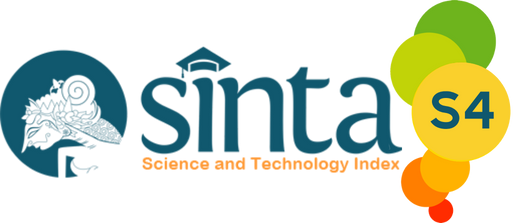Analisis Pengembangan Sintak Model Pembelajaran Project-based Learning pada Mata Pelajaran Dasar Listrik dan Eelektronika di Sekolah Vokasional
Abstract
This study aims to analyze the results of developing project-based learning methods for solving problems. Development is carried out by adding Project Based Learning syntax to the Learning Implementation Plan. This research method uses a Research and Development approach. The steps taken in this study include 1) needs analysis, 2) model development, 3) model validation, 4) limited trials, and 5) extended trials. The population and sample studied were vocational school students, with a total sample of 32 students. Sample selection using simple random sampling (simple random) and purposive random sampling. The analytical tools used are the normality test, homogeneity test and difference test. Based on the analysis results, it is known that the data on learning outcomes before the PjBL action averaged 79.66 with a deviation of 3.2. The lowest score is 77, and the highest score is 89. The average learning outcome data after the PjBL action is 87.58, with a deviation of 4.2. The lowest score is 77, and the highest score is 99. Based on the analysis results, it is known that the average learning outcome data before the PjBL action is 77.19, with a deviation of 1.5. The lowest score is 75, and the highest score is 80. The average learning outcome data after the PjBL action is 82.18, with a deviation of 3.7. The lowest score was 77, and the highest score was 97. The Wilcoxon Test analysis results showed differences in the score before project-based learning and the score after project-based learning. There is an influence of project-based learning on student learning values. Based on the analysis of learning development trials outlined in the lesson plan, project-based learning is feasible to use in improving student learning outcomes.
Keywords
Full Text:
PDF (Bahasa Indonesia)References
Aksela, M., & Haatainen, O. (2019). Project-based learning (PBL) in practise: Active teachers’ views of its’ advantages and challenges. Integrated Education for the Real World.
Al-Amarat, M. S. (2011). The classroom problems faced teachers at the public schools in Tafila Province, and proposed solutions. International Journal of Educational Sciences, 3(1), 37–48.
Almulla, M. A. (2020). The effectiveness of the project-based learning (PBL) approach as a way to engage students in learning. Sage Open, 10(3), 2158244020938702.
Arduini, G., & Chiusaroli, D. (2019). Experiential learning with augmented reality. EDUNOVATIC2019, 192.
Arikunto, S. (2019). Prosedur Penelitian Suatu Praktek Pendekatan Praktik. Jakarta: Rineka cipta.
Aslanides, C. D., Kalfa, V., Athanasiadou, S., Gianelos, Z., & Karapatsias, V. (2016). Advantages, disadvantages and the viability of project-based learning integration in Engineering studies curriculum: The Greek case. Proceedings of the 44th SEFI Conference, Tampere, Finland, 12–15.
Daryanto, M., & Raharjo. (2012). Model Pelajaran Inovatif (1st ed.). Yogyakarta: Gava Media.
Deslauriers, L., McCarty, L. S., Miller, K., Callaghan, K., & Kestin, G. (2019). Measuring actual learning versus feeling of learning in response to being actively engaged in the classroom. Proceedings of the National Academy of Sciences, 116(39), 19251–19257.
Dwiyogo, W. D. (2018). Developing a blended learning-based method for problem-solving in capability learning. Turkish Online Journal of Educational Technology-TOJET, 17(1), 51–61.
Efstratia, D. (2014). Experiential education through project based learning. Procedia-Social and Behavioral Sciences, 152, 1256–1260.
Fahrezi, I., Taufiq, M., Akhwani, A., & Nafia’ah, N. (2020). Meta-Analisis Pengaruh Model Pembelajaran Project Based Learning Terhadap Hasil Belajar Siswa Pada Mata Pelajaran IPA Sekolah Dasar. Jurnal Ilmiah Pendidikan Profesi Guru, 3(3), 408. https://doi.org/10.23887/jippg.v3i3.28081
Fajra, M., & NOVALINDA, R. (2020). Project Based Learning: Innovation To Improve the Suitability of Productive Competencies in Vocational High Schools With the Needs of the World of Work. International Journal Of Multi Science, 1(08), 1–11.
Gall, M. D., Borg, W. R., & Gall, J. P. (1996). Educational research: An introduction. Longman Publishing.
Garnjost, P., & Lawter, L. (2019). Undergraduates’ satisfaction and perceptions of learning outcomes across teacher-and learner-focused pedagogies. The International Journal of Management Education, 17(2), 267–275.
Göçen, A., Eral, S. H., & Bücük, M. H. (2020). Teacher perceptions of a 21st century classroom. International Journal of Contemporary Educational Research, 7(1), 85–98.
Indrawan, E., & Jalinus, N. (2019). Review project based learning. International Journal of Science and Research (IJSR), 8(4), 1014–1018.
Jabarullah, N. H., & Hussain, H. I. (2019). The effectiveness of problem-based learning in technical and vocational education in Malaysia. Education+ Training.
Jonassen, D. H. (1997). Instructional design models for well-structured and III-structured problem-solving learning outcomes. Educational Technology Research and Development, 45(1), 65–94.
Kaur, G. (2011). Study and analysis of lecture model of teaching. International Journal of Educational Planning & Administration, 1(1), 9–13.
Kokotsaki, D., Menzies, V., & Wiggins, A. (2016). Project-based learning: A review of the literature. Improving Schools, 19(3), 267–277.
Kusumaningrum, S., & Djukri, D. (2016). Pengembangan perangkat pembelajaran model project based learning (PjBL) untuk meningkatkan keterampilan proses sains dan kreativitas. Jurnal Inovasi Pendidikan IPA, 2(2), 241. https://doi.org/10.21831/jipi.v2i2.5557
Masika, R., & Jones, J. (2016). Building student belonging and engagement: Insights into higher education students’ experiences of participating and learning together. Teaching in Higher Education, 21(2), 138–150.
Mihic, M., & Zavrski, I. (2017). Professors’ and students’ perception of the advantages and disadvantages of project based learning. Int. J. Eng. Educ, 33(6), 1737–1750.
Mulyadi, E. (2016). Penerapan Model Project Based Learning untuk Meningkatan Kinerja dan Prestasi Belajar Fisika Siswa SMK. Jurnal Pendidikan Teknologi Dan Kejuruan, 22(4), 385. https://doi.org/10.21831/jptk.v22i4.7836
Puspitarini, Y. D., & Hanif, M. (2019). Using Learning Media to Increase Learning Motivation in Elementary School. Anatolian Journal of Education, 4(2), 53–60.
Retnawati, H., Hadi, S., & Nugraha, A. C. (2016). Vocational High School Teachers’ Difficulties in Implementing the Assessment in Curriculum 2013 in Yogyakarta Province of Indonesia. International Journal of Instruction, 9(1), 33–48.
Shaturaev, J. (2021). indonesia: superior policies and management for better education (Community development through Education). Архив Научных Исследований, 1(1).
Silalahi, T. F., & Hutauruk, A. F. (2020). The application of cooperative learning model during online learning in the pandemic period. Budapest International Research and Critics Institute-Journal (BIRCI-Journal), 3(3), 1683–1691.
Suartini, T. (2019). Influence Application of Learning Model on Vocational Education Based on Quality Issurance. Sage Open, 9(2), 2158244019851552.
Sudargini, Y., & Purwanto, A. (2020). the Effect of Teachers Pedagogic Competency on the Learning Outcomes of Students. Journal of Industrial Engineering & Management Research, 1(4), 1–8.
Sumarni, W., & Kadarwati, S. (2020). Ethno-stem project-based learning: Its impact to critical and creative thinking skills. Jurnal Pendidikan IPA Indonesia, 9(1), 11–21.
Syahril, S., Jalinus, N., Nabawi, R. A., & Arbi, Y. (2019). The Create Skills of Vocational Students to Design a Product: Comparison Project Based Learning Versus Cooperative Learning-Project Based Learning. 5th UPI International Conference on Technical and Vocational Education and Training (ICTVET 2018), 316–320. Atlantis Press.
Wan, Z. H., So, W. M. W., & Zhan, Y. (2020). Developing and validating a scale of STEM project-based learning experience. Research in Science Education, 1–17.
Warr, M., & West, R. E. (2020). Bridging academic disciplines with interdisciplinary project-based learning: Challenges and opportunities. Interdisciplinary Journal of Problem-Based Learning, 14(1).
Werdhiastutie, A., Suhariadi, F., & Partiwi, S. G. (2020). Achievement Motivation as Antecedents of Quality Improvement of Organizational Human Resources. Budapest International Research and Critics Institute-Journal (BIRCI-Journal) Volume, 3, 747–752.
Winingsih, L. H., Agung, I., & Sulistiono, A. A. (2019). The Influence of Government Policy, Principle Leadership, and Participation of Parents on Strengthening Teacher Organizations (KKG/MGMP) and Development of Problem Solving in Students: Indonesia Case. International Journal of Education and Practice, 7(4), 479–493.
Wolfgang, C. H., & Glickman, C. D. (1980). Solving Discipline Problems: Strategies for Classroom Teachers. ERIC.
Wulandari, D., Narmaditya, B. S., Utomo, S. H., & Prayi, P. H. (2019). Teachers’ perception on classroom action research. KnE Social Sciences, 313–320.








